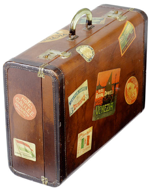Hilda’s suitcase: when’s the right time to discuss leaving a legacy?
- Written by
- Norma Cameron
- Added
- May 20, 2013

After reading John Webster Hochstadt’s article on the Cygnus donor survey in September’s Gift Planning in Canada Journal, I kept thinking about the ‘two per cent’ (the percentage of donors who reported that they were influenced by someone from the charity when they established a bequest).
Following this John queried whether or not gift planners were wasting their time and perhaps we should fold our tents and go home. Penelope Burke, president of Cygnus Applied Research, Inc, who conducted the survey, responded by saying the two per cent should, instead, serve as a wake-up call.

Well it certainly woke me up and got me thinking about my own track record in influencing decisions on gift planning. And that train of thought brought clearly into focus a situation that I initially thought would stand as my worst ‘lack-of-influence’ story, but in the end turned out to be a perfect learning opportunity. Let me explain.
I had no idea that my mother would end up teaching me a very important lesson about gift planning. You see, when I first started dabbling in this realm, back in the mid-nineties, I soon realised that someone I had to talk to about getting her affairs in order was my mother (who lives in the United Kingdom). However, despite my best efforts to raise the topic either when I visited her or during our weekly phone calls, she would say, ‘I don’t have very much and when I’m gone I’m sure you’ll all be able to work it out’. She explained that she didn’t even want to think about it, far less discuss it. Eventually I got the message, folded up my proverbial tent and went home.
Years passed, and unfortunately more of our weekly phone calls featured mum describing yet another funeral she’d attended. She was now in her eighties and her friends were dying. Despite the creative segues that danced in my head during these conversations, I resisted the urge to raise the topic of her will or funeral plans. Then one day, things changed – the day my mum told me the following story.
She was heading home from a five-day coach tour of Cornwall with four of her closest friends. They had enjoyed a wonderful ‘tinsel and turkey tour’ (albeit in November – due to the off peak discounted rates for older people they usually managed to fit in at least four such Santa-laden trips each winter). They were having a particularly riotous time reliving one of their holiday highlights, laughing heartily when suddenly Hilda, one of her oldest friends, slumped over in her seat. It didn’t take long for everyone on board to realise that Hilda was gone and wouldn’t be coming back.
The coach pulled into a motorway lay-by; emergency services arrived and left taking Hilda with them. When the coach reached its final destination, my mother and her friends collected their cases from the neatly stacked row alongside the coach. And then they stood there, rather stunned at what had just happened. Soon all the other passengers were on their way, being picked up by family, friends, or piling into taxis – all the while murmuring about the ‘death on the bus’ and there she stood with her now-only-three friends – all staring at one case that hadn’t been picked up. It was Hilda’s and no one really knew what to do with it. You see Hilda was a widow with one estranged son who lived in Australia.
And so, they stood, staring at that old brown suitcase, featuring an oversized label on each side bearing Hilda’s name and address, prefaced by the phrase: if lost, please return to…
After my mother had finished telling me her story, there was a pause on the line and she said, ‘When you come home in September, do you think we could talk about, you know, those arrangements’. I knew exactly what she meant and simply said, ‘Of course’. After another shorter pause, she said that if she had a choice, she’d like to ‘go’ the same way Hilda did: returning from a great holiday, surrounded by friends and spending her last moments on this earth enjoying a good laugh.
When September rolled around, my mother kept to her word. To be honest, we ended up having much too much fun in drafting her will and deciding between the multiple choices on offer regarding funeral arrangements. This whole exercise also had the added benefit of bringing our family, who are spread across Scotland, England, Canada and Australia just that little closer. And while my mother isn’t a wealthy woman, she decided to carve out a portion to support her favourite charities through a percentage-based residual gift (and, yes, my heart soared).
From a professional perspective, I learned the importance of letting your prospects and donors know you’re ready, willing and able to be there whenever they decide the time is right. So, I think we should unfold those tents and accept Burke’s challenge to step it up. We need to build the type of relationships that instils a level of confidence in our donors’ hearts and minds that will propel them to choose our charity when the time is right.
For my mother, the time was suddenly right when she sat at home not knowing what to do with Hilda’s suitcase that now sat facing her on the living room carpet.
An article reprinted, with permission, from the October 2010 issue of the Gift Planning In Canada Journal.

















